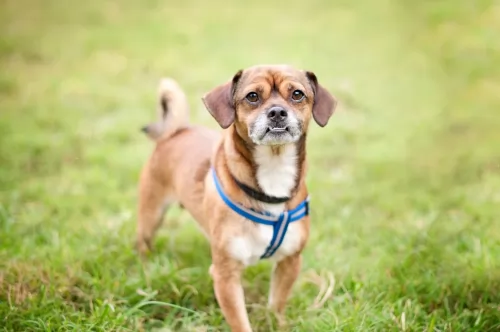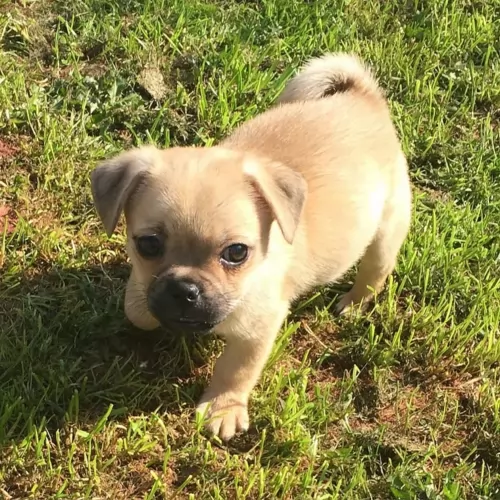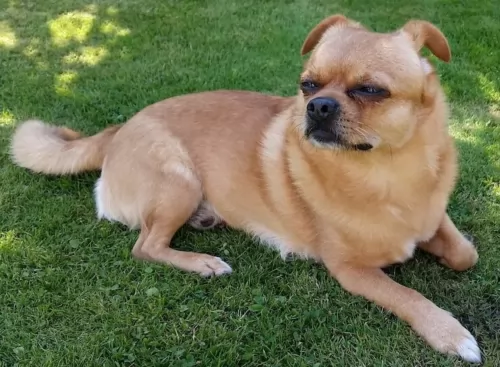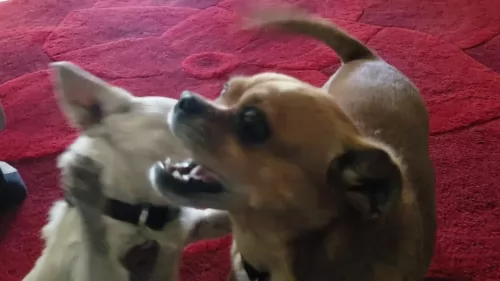 Petzlover
Petzlover Both Chug and Golden Doodle are originated from United States. Chug may grow 41 cm / 16 inches shorter than Golden Doodle. Chug may weigh 11 kg / 24 pounds lesser than Golden Doodle. Both Chug and Golden Doodle has almost same life span. Both Chug and Golden Doodle has same litter size. Both Chug and Golden Doodle requires Moderate Maintenance.
Both Chug and Golden Doodle are originated from United States. Chug may grow 41 cm / 16 inches shorter than Golden Doodle. Chug may weigh 11 kg / 24 pounds lesser than Golden Doodle. Both Chug and Golden Doodle has almost same life span. Both Chug and Golden Doodle has same litter size. Both Chug and Golden Doodle requires Moderate Maintenance.
 The Chug is a crossbreed with the Pug and the Chihuahua. It is a hybrid not a purebred. Over the past ten to fifteen years people have been developing the Chug, mostly in the United States. People were looking for a lapdog with the characteristics of both the Chihuahua and the Pug. The hybrid dog has characteristics of both breeds, both physical and behavioral. Of course, the Chug is not recognized by the AKC, but it is recognized by hybrid and designer dog clubs such as The American Canine Hybrid Club, Designer Breed Kennel and the International Designer Canine Registry.
The Chug is a crossbreed with the Pug and the Chihuahua. It is a hybrid not a purebred. Over the past ten to fifteen years people have been developing the Chug, mostly in the United States. People were looking for a lapdog with the characteristics of both the Chihuahua and the Pug. The hybrid dog has characteristics of both breeds, both physical and behavioral. Of course, the Chug is not recognized by the AKC, but it is recognized by hybrid and designer dog clubs such as The American Canine Hybrid Club, Designer Breed Kennel and the International Designer Canine Registry.
 The Goldendoodle, known fondly as the Golden Poo, originates from the USA and was first bred in the 1990’s, coming about because of two popular dog breeds being mated together – the Golden Labrador and the Poodle.
The Goldendoodle, known fondly as the Golden Poo, originates from the USA and was first bred in the 1990’s, coming about because of two popular dog breeds being mated together – the Golden Labrador and the Poodle.
He isn’t recognized as a standardized breed by any of the major kennel clubs. The beautiful dog was first bred in 1969 by Monica Dickens, and of course when everybody saw the little golden ball of sheer delight, everybody wanted one and the dog’s popularity soared.
The original purpose of the cross-breed was to develop guide dogs which would go down well with people with allergies. Today, not all Goldendoodles are hypoallergenic, but they’re also popular because they have a low shedding coat.
 The Chug can vary greatly in looks and build from one dog to another. For the most part however, Chugs are small compact dogs, sturdy and muscular. They have a very expressive and lovable face with folding ears, almond shape eyes and short muzzles. Their faces are similar in looks to that of a miniature boxer. .
The Chug can vary greatly in looks and build from one dog to another. For the most part however, Chugs are small compact dogs, sturdy and muscular. They have a very expressive and lovable face with folding ears, almond shape eyes and short muzzles. Their faces are similar in looks to that of a miniature boxer. .
 The Goldendoodle is a medium sized dog, standing between 61 -66 cm in height and weighing between 14 – 20kg. Nothing is set in stone with regards to his size as the Poodle can be Toy, Miniature and Standard, meaning the Goldendoodle can be a smallish dog or he can be a large dog.
The Goldendoodle is a medium sized dog, standing between 61 -66 cm in height and weighing between 14 – 20kg. Nothing is set in stone with regards to his size as the Poodle can be Toy, Miniature and Standard, meaning the Goldendoodle can be a smallish dog or he can be a large dog.
His coat is usually golden, cream, yellow, red and even leaning towards brown or black. It is mostly medium length and wavy or even curly. Many Goldendoodle owners send their pets in to have their coats professionally shorn.
He has medium length, floppy ears and the tail is long.
Making the most wonderful family pet and companion, Goldendoodles have just the right temperament for them to be used as therapy- or rescue dogs. They’re bright, outgoing alert, social, gentle, loving, patient with children, adults and pets and friendly and amicable as well.
They’ve inherited wonderful characteristics from both the poodle and the Golden Labrador. He is an energetic dog so even though he adapts well to city life or country life, he will need to have exercise as in walks and ball games.
 Because they are a hybrid, chugs can have a very wide range of different characteristics depending upon whether they have more from the Pug or more from the Chihuahua. But either way they are very lovable little dogs with big personalities. Regardless of whether your dog favors the clown Pug or the stately Chihuahua, your puppy will be a lovable ball of fur. He will be affectionate, friendly and aggressive to bigger dogs.
Because they are a hybrid, chugs can have a very wide range of different characteristics depending upon whether they have more from the Pug or more from the Chihuahua. But either way they are very lovable little dogs with big personalities. Regardless of whether your dog favors the clown Pug or the stately Chihuahua, your puppy will be a lovable ball of fur. He will be affectionate, friendly and aggressive to bigger dogs.
 Your Goldendoodle is sure to be a real joy in your home. He is a lively, healthy dog breed and when you treat him like a family member, a real deep bond can be developed.
Your Goldendoodle is sure to be a real joy in your home. He is a lively, healthy dog breed and when you treat him like a family member, a real deep bond can be developed.
He loves to be included in everything going on in the household and doesn't like being left alone for a long time. He has wonderful characteristics from the Golden Retriever and the Poodle as both these dog breeds are known for their friendly, patient, kind, amicable and intelligent personalities.
Easy to train, your Goldendoodle is obedient and wants to please, and is just waiting to become a loyal, loving friend in your family.
 The Goldendoodle is a healthy dog, but each breed involved with bringing about the Goldendoodle - Poodles and Golden Retrievers – can be prone to hip dysplasia. Both dog breeds are also susceptible to inheritable eye disorders.
The Goldendoodle is a healthy dog, but each breed involved with bringing about the Goldendoodle - Poodles and Golden Retrievers – can be prone to hip dysplasia. Both dog breeds are also susceptible to inheritable eye disorders.
There are some common dog ailments worth knowing about. The idea is to get your pet to the vet as soon as possible when you detect that he isn’t his usual self.
Allergic skin disease is common in other dog breeds as well, and once the allergen is inhaled or absorbed, your pet can battle terribly with itchy, red skin. This inflammatory, chronic skin disease can drive your pet mad and you’ll see him scratching and licking continually. Get him to the vet as soon as possible because it may just be a case of changing his diet.
This is something that can even be seen in young dogs when the hip joints don’t develop normally. It can cause arthritis, terrible pain and lameness with your pet.
You’ll notice that your pet battles to see- and get around at night. Signs of night blindness can lead to loss of vision, particularly with your middle-aged Goldendoodle.
 Pugs have great appetites and love to eat and Chihuahuas wont turn down a meal so be careful not to overfeed your Chug. It is important to feed a small breed formula whether you use dry or wet food.
Pugs have great appetites and love to eat and Chihuahuas wont turn down a meal so be careful not to overfeed your Chug. It is important to feed a small breed formula whether you use dry or wet food.
Some additional issues that Chugs deal with in respect to health include:
Both elbow and knee inflammations can lead to arthritis and lameness
Chugs can have runny eyes or cherry eye. If they have cherry eye you will want to treat it immediately or there could be secondary issues with inflammation and infection.
Chugs may be little, but they still need a moderate amount of exercise every day. A regular walk will do or indoor or outdoor playtime every day. They like obedience, rally and some can do small dog agility, but they would have to be on the larger size for Chugs. Chugs also make great therapy dogs.
 Taking care of a Goldendoodle isn't only about feeding him and seeing he has a fresh bowl of water available. It’s about making him part of the family and giving him love and attention just like with any family member. He needs -
Taking care of a Goldendoodle isn't only about feeding him and seeing he has a fresh bowl of water available. It’s about making him part of the family and giving him love and attention just like with any family member. He needs -
Good nutritious food to keep him healthy.
A warm dry place to sleep at night.
A place during the day that offers shade from the sun and shelter from the rain.
He needs to be brushed to remove loose hairs, have his nails trimmed, his ears checked for infection and his teeth brushed 2 or 3 times a week.
He needs to be exercised – walks, ball and rope games, swimming and joining you in your activities.
He needs to be taken to the vet when he is showing signs of illness.
He needs love, care and attention just like any other family member.